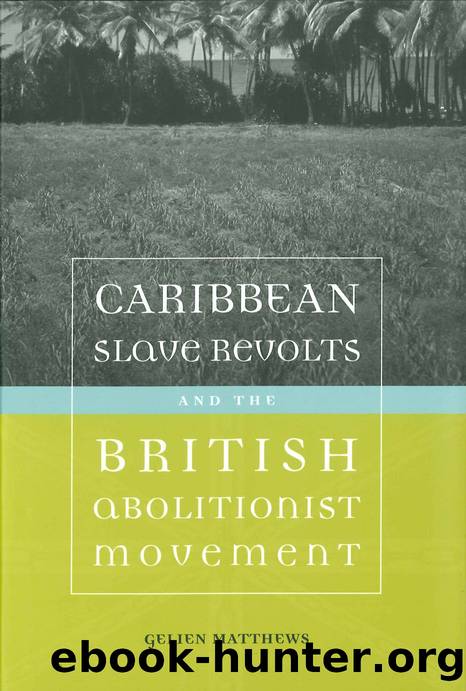CARIBBEAN SLAVE REVOLTS AND THE BRITISH ABOLITIONIST MOVEMENT by GELIEN MATTHEWS

Author:GELIEN MATTHEWS
Language: eng
Format: epub
Publisher: Louisiana State University Press
Published: 2006-11-14T16:00:00+00:00
become so unbearable that there arose from it the celebrated Petitions of Rights ⦠left to this country by that illustrious lawyer, Lord Coke ⦠The petition declares, that all such proceedings shall henceforward be put down: it declares that âno man shall be fore-judged by life and limb against the form of the Great Charter;â that âno man ought to be adjudged by death but by the laws established in this realm, either by the custom of the realm, or by acts of parliament;â and that âthe commissions for proceeding by martial law should be revoked and annulled, lest, by color of them, any of his Majestyâs subjects be destroyed or put to death, contrary to the laws and franchise of the land.â Since that time, no such thing as martial law has been recognized in this country; and courts founded on proclamations of martial law have been wholly unknown ⦠Afterwards came the annual Mutiny Acts, and Courts Martial, which were held only under those acts ⦠These courts were restricted to the trial of soldiers for military offences; and the extent of their powers was pointed out and limited by law.89
The colonists could have argued that proclamation of martial law rendered every man to be treated as a soldier and therefore susceptible to be tried by the court. Broughamâs conclusion was that once the revolt had been quelled, martial law should have ceased. The court martial in Demerara had overstepped its jurisdiction. The abolitionists used this abuse of power as an opportunity to call upon Parliament to exercise its duty to reconcile the colonial legal system with that which operated in Britain. The proposal to end courts martial in the colonies also showed that slave rebellion was a basis upon which abolitionists sought to reform the structure of the slave plantation societies of the English Caribbean. Broughamâs June 1824 speeches ended with a motion praying most earnestly that âHis Majesty adopt measures ⦠for securing such a just and humane administration of law in that colony as may protect the voluntary instructors of the Negroes, as well as the Negroes themselves, and the rest of His Majestyâs subjects from oppression.â90
Brougham and others used the deaths of slaves following the Demerara rebellion to pressure Parliament and the public to rethink and take corrective action on the regime of slavery. Brougham energized the suffering of the slaves by urging âParliament to rescue the West Indians from the horrors of such a policy; to deliver those misguided men from their own hands; I call upon you to interpose while it is yet time to save the West Indies ⦠their masters, whose short-sighted violence is, indeed, hurtful to their slaves, but to themselves is fraught with fearful and speedy destruction if you do not at once make your voice heard and your authority felt, where both have been so long despised.â91
The Anti-Slavery Society was convinced that the mode of the trials âwill afford no small matter of deep reflection to the people.
Download
This site does not store any files on its server. We only index and link to content provided by other sites. Please contact the content providers to delete copyright contents if any and email us, we'll remove relevant links or contents immediately.
The Dawn of Everything by David Graeber & David Wengrow(1691)
The Bomber Mafia by Malcolm Gladwell(1620)
Facing the Mountain by Daniel James Brown(1545)
Submerged Prehistory by Benjamin Jonathan; & Clive Bonsall & Catriona Pickard & Anders Fischer(1452)
Wandering in Strange Lands by Morgan Jerkins(1419)
Tip Top by Bill James(1409)
Driving While Brown: Sheriff Joe Arpaio Versus the Latino Resistance by Terry Greene Sterling & Jude Joffe-Block(1364)
Red Roulette : An Insider's Story of Wealth, Power, Corruption, and Vengeance in Today's China (9781982156176) by Shum Desmond(1350)
Evil Geniuses: The Unmaking of America: A Recent History by Kurt Andersen(1345)
The Way of Fire and Ice: The Living Tradition of Norse Paganism by Ryan Smith(1324)
American Kompromat by Craig Unger(1307)
It Was All a Lie by Stuart Stevens;(1294)
F*cking History by The Captain(1289)
American Dreams by Unknown(1277)
Treasure Islands: Tax Havens and the Men who Stole the World by Nicholas Shaxson(1254)
Evil Geniuses by Kurt Andersen(1249)
White House Inc. by Dan Alexander(1206)
The First Conspiracy by Brad Meltzer & Josh Mensch(1167)
The Fifteen Biggest Lies about the Economy: And Everything Else the Right Doesn't Want You to Know about Taxes, Jobs, and Corporate America by Joshua Holland(1115)
